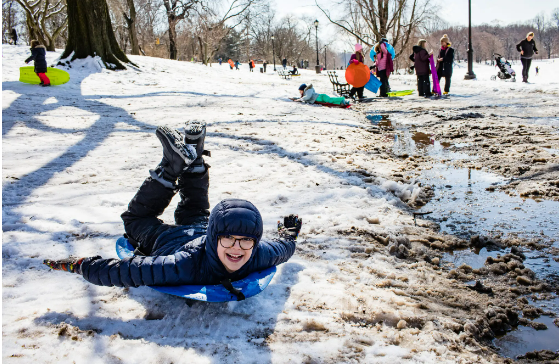我们通过发表他们的论文来表彰我们学生社论大赛的前 10 名获奖者。这是15岁的Sheerea Yu。

。。。斯蒂芬·斯佩兰扎为《纽约时报》
这篇文章由来自田纳西州纳什维尔纳什维尔大学学院的 Sheerea Yu 撰写,15 岁,是学习网络第八届年度学生社论大赛的前 10 名获奖者之一,我们收到了 11,202 份参赛作品。
Save the Snow Day: Save Teenage Education
The fledgling hope of a snow day offers a reprieve from the unforgiving Winter Break to Spring Break stretch. Nothing lights up the spirit quite like seeing a blanket of snow cover the ground, pristine and sparkling; checking the school’s Twitter confirms that eight hours of the day lie ahead, cleared.
This year, as schools became more comfortable with online learning, many school districts canceled snow days for the season. In that number was New York City, the nation’s largest school system. Several superintendents have already extrapolated the decision into the future, planning to utilize the technology and systems set up during the pandemic to cancel snow days forever.
Taking away the most potent symbol of playtime and joy and being a kid, the bona fide snow day, is unacceptable.
I had online classes on what would certainly have been a snow day in past years, but with the school workload as normal, I calculated that playing in the snow would make it difficult to stay on top of everything. Why struggle to fit playtime, of all things, into my schedule when there were so many other things I should be doing?
Anne Helen Peterson for Buzzfeed News explains that the millennial generation, growing into a work force that had already become efficient and stellar at turning a profit, needed to be “optimized” to survive. My generation, Generation Z, has felt the pressure as much as, if not more than, the one that came before it. Kids playing games in the neighborhood have turned into “supervised play dates.” Kicking around a soccer ball or hanging out at the basketball court has turned into “highly regulated organized league play.”
On one hand, we seem to be progressing faster than our parents and grandparents. We all know of high schoolers that have done cancer research or founded businesses. But how guided, how “optimized,” were they? How sustainable is this sort of education that funnels us into “achievement” rather than having us discover it for ourselves?
In other words, I’m scared. A chunk of our education, play, has been missing. In history class I chose to write the safe essay instead of brainstorming a political cartoon. I meticulously check the boxes on assignments, analyzing how I can score all the points. I’m an expert at following the directions.
This would not be simply a wave goodbye to a happy childhood tradition; it would be another nail in the coffin the education of kids has been squeezed into. Snow days teach lessons that cannot be taught as a curriculum, lessons about how to let the mind be creative, explore or simply exist that have been sorely missing.
Next year, take some time to build a snowman. It’s educational!
Works Cited
Cramer, Maria. “Sorry, Kids. Snow Days Are Probably Over.” The New York Times, 16 Dec. 2020.
Petersen, Anne Helen. “How Millennials Became the Burnout Generation.” Buzzfeed News, 5 Jan. 2019.